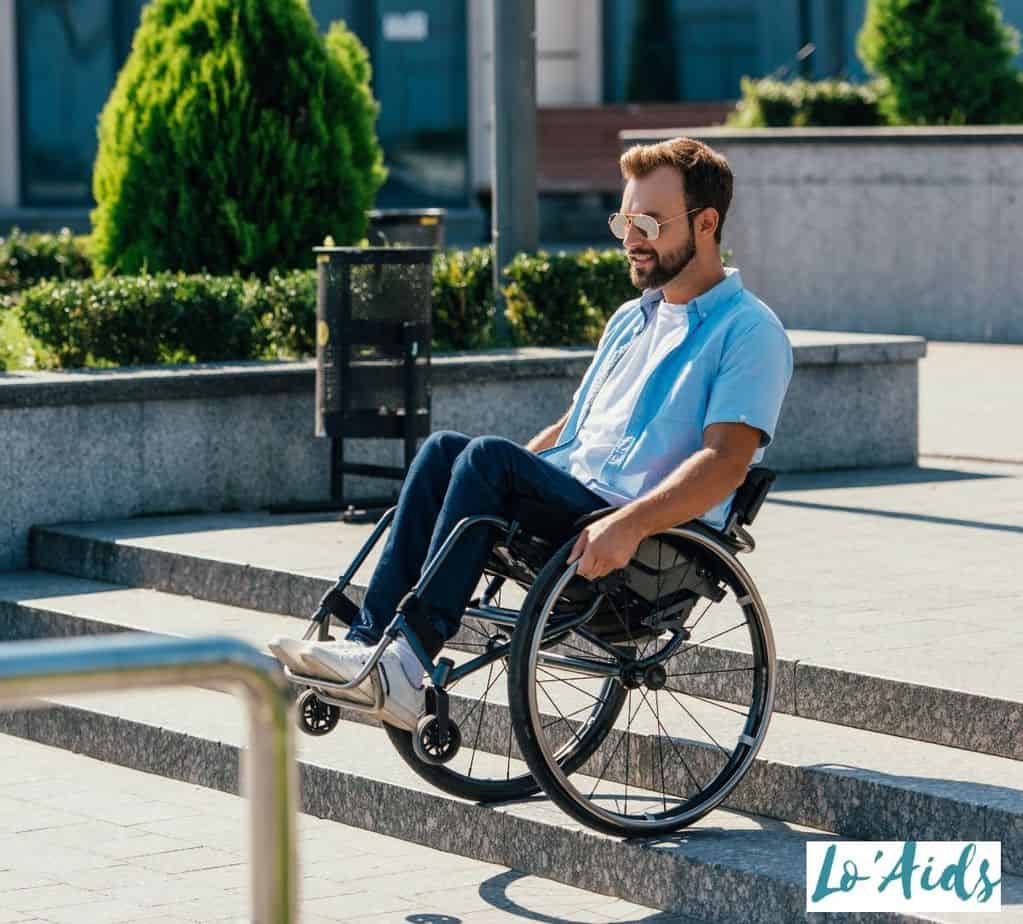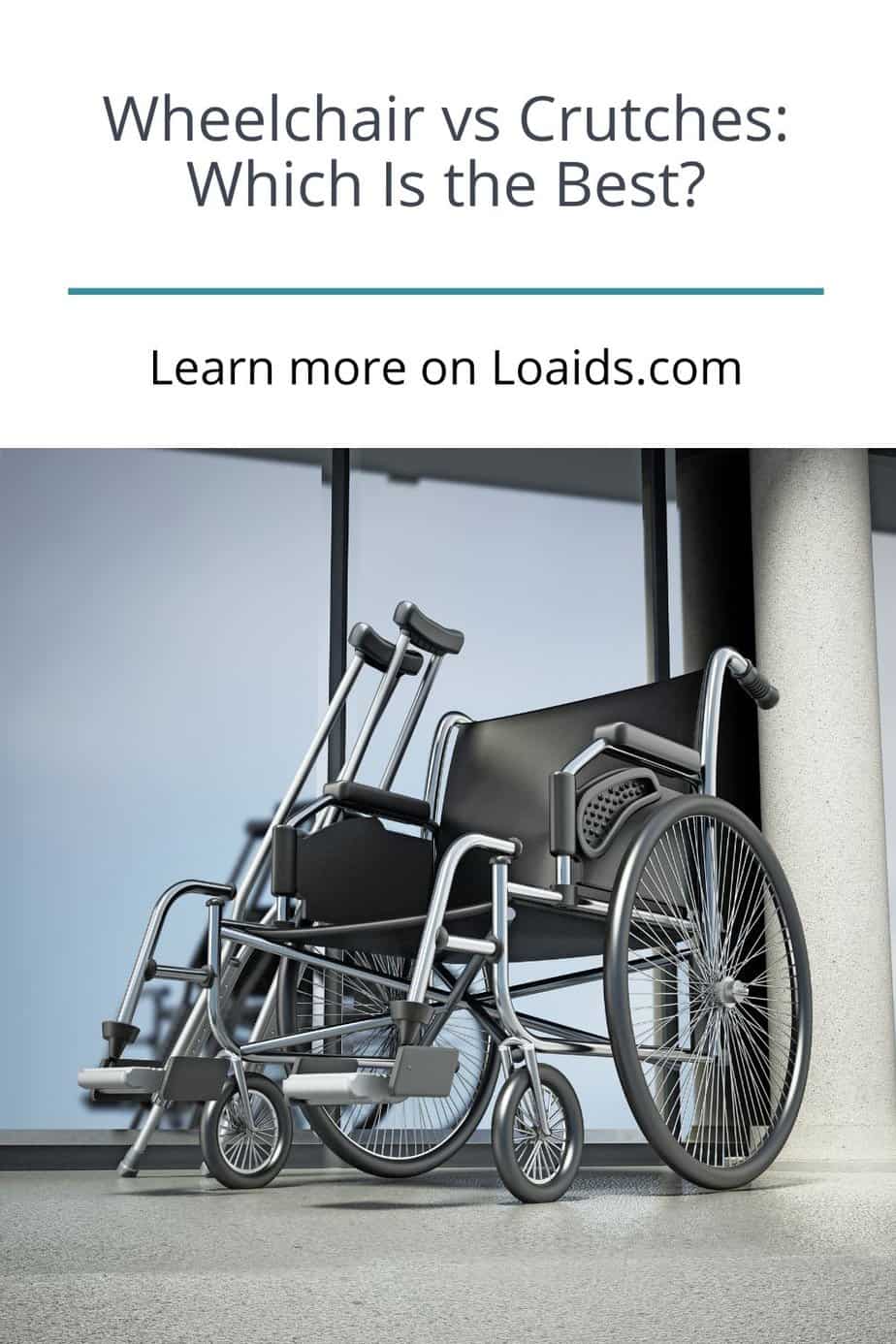Which assistive device should you choose in a wheelchair vs crutches comparison? That’s something some of the 13.7% of adults with mobility disabilities in the US would want to know (1).
I use a wheelchair because of my type of disability and their greater balance, but some people prefer crutches because they have shorter-term injuries and because of the price. Read on to make your choice!
Also Read: 14 Different Types of Wheelchairs for Elderly
Table of Contents
Key Takeaways
- Both wheelchairs and crutches offer disabled people proper assistance, but they have different benefits.
- Wheelchairs are better suited to long-term injuries or neurological disabilities, while crutches are better for short-term injuries.
- Wheelchairs have better accessibility features, though they’ll make you struggle in tight spaces where crutches are easier to use.
Wheelchair vs Crutches: Which Is The Better Mobility Aid?
Both wheelchairs and crutches are valuable medical devices for people with disabilities.
Sometimes they overlap in their importance to disabled people. Does that make one of them superior?
To answer that question, let’s examine each assistive device’s pros and cons.
Pros of Wheelchairs

Wheelchairs are by far one of the most stable mobility aids. Not only do they bear greater weight, but they also have electric options, making them more convenient.
I have never regretted getting a wheelchair. With it, I don’t have to worry too much about balancing on unstable surfaces.
Wheelchairs are also more comfortable and offer users a great sense of independent mobility (2).
You must have heard or seen wheelchair hiking enthusiasts that live as independently as any other person.
If you haven’t, here is a video that will prove that a disabled person can do almost anything in a wheelchair.
With a wheelchair, you won’t have to transfer to a chair or office seat every time.
Most wheelchairs also come with a small cargo compartment beneath the wheelchair to help carry small additional items. Try carrying something with crutches!
Besides, you can customize a wheelchair to have a drink holder for wheelchair!
That makes wheelchairs an excellent mobility device for people with disabilities.
Cons of Wheelchairs
Wheelchair transportation can be a nightmare, thanks to their size. It would be best if you also had special wheelchair equipment such as ramps or platform lifts to use them effectively.
Do I have to mention that wheelchairs can’t climb stairs? Also, their large size means navigating the tight spaces in your home.
You have to make your home wheelchair friendly for better use, which will be pretty expensive.
Another major sticking point is the price of wheelchairs. They are pretty expensive.
Pros of Crutches

Are you recovering from a broken leg or ankle? Your best bet will be to go for crutches.
Though not the most advanced devices, they’re the best option for short-term injuries interfering with your mobility.
Though they’ll need some proper arm strength, crutches will help you protect the injured ankle or foot. You can adjust their height for a proper fit.
They are also perfect for climbing stairs, albeit slowly.
Crutches are also relatively easy to transport, unlike wheelchairs. If you need to navigate tight spaces, this is the type of mobility aid to consider.
Cons of Crutches
Life on crutches needs you to have enough upper body strength (3). They also won’t offer the continued leg injury support wheelchairs are excellent at.
You’ll often have to worry about losing your balance and falling, especially on rugged terrains.
There’s no such worry when in a personal wheelchair that helps you access the most accessible services.
Crutches aren’t so helpful when you have to carry additional items. Your hands will be on the crutches, so there’s little space for an additional carry-on item.
Choosing Between a Wheelchair and Crutches
So, personal wheelchair or crutches? Here are some considerations when deciding on that.
1. Type of Injury or Disability
The type of injury you’re suffering from should influence your choice. For instance, you won’t need to buy an electric wheelchair when it’s only a broken ankle.
On the flip side, long-term injuries or disabilities will need you to get a more balanced assistive device.
2. Upper Body Strength
Both crutches and wheelchairs need an adequate amount of upper body strength.
But if you feel your arms don’t have all that strength, it makes sense to go for the one that strains you less.
Besides that, you can always practice some upper body exercises to attain the required strength.
The below video will help.
3. Weight Limits
Each of the mobility devices has weight restrictions. It pays to know the weight each of them can carry before selecting one.
The wrong decision could aggravate the injury, slow your recovery, or make life increasingly difficult.
That’s why weight limits are essential when choosing either mobility aid.
4. Price
After running everything down and deciding whether you want a specific mobility aid, you must consider the price.
The price of wheelchairs is higher than that of crutches. So it all comes down to your budget and whether it can accommodate your choice of mobility aid.
A proper wheelchair will cost between $500 and $1,500. You can get a manual wheelchair for as little as $100 on social media.
The price of crutches depends on the brand, but you can expect to get them for anything between $20 and $50.
5. Comfort and Convenience
Though the kind of mobility disability will affect the type of mobility aid you choose, it all should come down to comfort and convenience.
Wheelchairs are more comfortable for their continued leg injury support. But remember, continued leg injury support isn’t the only thing to base on when considering convenience.
6. Safety
It makes little sense to have a medical device that doesn’t guarantee your safety. That’s why you must consider your safety in the wheelchair or crutches before settling on one.
You don’t want to return to your physical therapist with an injury you could have easily avoided.
FAQs
What is better than crutches?
A knee scooter is an excellent alternative if your knees are strong enough to support your weight.
Do you need a wheelchair for a broken leg?
The severity of the injury will dictate your need for a wheelchair. You can use any other mobility aid unless advised by a doctor to use a wheelchair.
Can mobility scooters replace wheelchairs?
Yes, a mobility scooter would be a fantastic replacement for a wheelchair. Try electric scooters if you don’t want a wheelchair.
Conclusion
Settling the wheelchair vs crutches debate purely on what they do is quite challenging.
Crutches as manually powered mobility aids are perfect for short-term injuries. They are cheap and easy to transport, though they have no space for carry-on baggage.
Wheelchairs are more convenient for long-term disabilities and offer more independence.
Both are excellent devices for people with mobility disabilities. So it all comes down to preference. This comparison will help you select the equipment that’ll work for you.

So, wheelchair vs crutches, which one fits your need? Let us know in the comments section!
References
- 1. Centers for Disease Control and Prevention. Disability Impacts All of Us Infographic [Internet]. Centers for Disease Control and Prevention. 2020. Available from: https://www.cdc.gov/ncbddd/disabilityandhealth/infographic-disability-impacts-all.html
- 2. Koontz AM, Ding D, Jan Y-K, de Groot S, Hansen A. Wheeled Mobility. BioMed Research International [Internet]. 2015;2015:1–2. Available from: https://www.ncbi.nlm.nih.gov/pmc/articles/PMC4397418/
- 3. Warees WM, Slane M. Crutches [Internet]. PubMed. Treasure Island (FL): StatPearls Publishing; 2020. Available from: https://www.ncbi.nlm.nih.gov/books/NBK539724/




